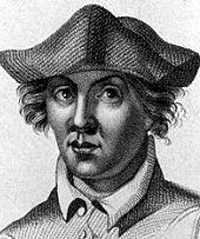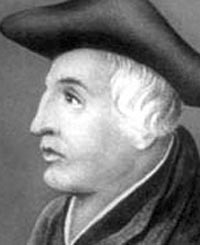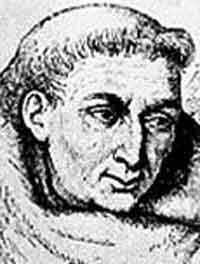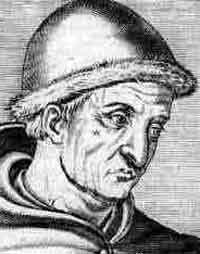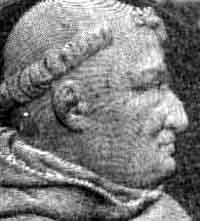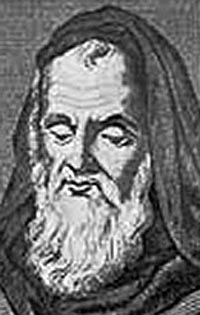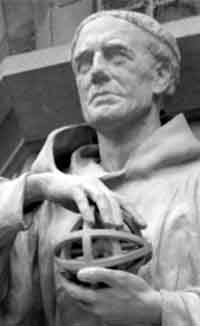as John Dee alludes: David Dee of Radik
Copyright Michael D. Robbins 2006
Astro-Rayological
Interpretation & Charts
Quotes
Biography
Images and Physiognomic Interpretation
(c.1214-1294)
Bacon, Roger, b. c. 1220,, Ilchester, Somerset, or Bisley, Gloucester?, Eng. d. 1292, Oxford? byname DOCTOR MIRABILIS (LATIN: "WONDERFUL TEACHER"), English Franciscan philosopher and educational reformer who was a major medieval proponent of experimental science.
Bacon studied mathematics, astronomy, optics, alchemy, and languages. He was the first European to describe in detail the process of making gunpowder, and he proposed flying machines and motorized ships and carriages. Bacon (as he himself complacently remarked) displayed a prodigious energy and zeal in the pursuit of experimental science; indeed, his studies were talked about everywhere and eventually won him a place in popular literature as a kind of wonder worker.
Bacon therefore represents a historically precocious expression of the empirical spirit of experimental science, even though his actual practice of it seems to have been exaggerated.
Early life
Bacon was born into a wealthy family; he was well-versed in the classics and enjoyed the advantages of an early training in geometry, arithmetic, music, and astronomy.
Inasmuch as he later lectured at Paris, it is probable that his master of arts degree was conferred there, presumably not before 1241--a date in keeping with his claim that he saw the Franciscan professor Alexander of Hales (who died in 1245) with his own eyes and that he heard the master scholar William of Auvergne (d. 1249) dispute twice in the presence of the whole university.
University and scientific career.
In the earlier part of his career, Bacon lectured in the faculty of arts on Aristotelian and pseudo-Aristotelian treatises, displaying no indication of his later preoccupation with science.
His Paris lectures, important in enabling scholars to form some idea of the work done by one who was a pioneer in introducing the works of Aristotle into western Europe, reveal an Aristotelianism strongly marked by Neoplatonist elements stemming from many different sources. The influence of Avicenna on Bacon has been exaggerated.
About 1247 a considerable change took place in Bacon's intellectual development.
From that date forward he expended much time and energy and huge sums of money in experimental research, in acquiring "secret" books, in the construction of instruments and of tables, in the training of assistants, and in seeking the friendship of savants--activities that marked a definite departure from the usual routine of the faculty of arts.
The change was probably caused by his return to Oxford and the influence there of the great scholar Robert Grosseteste, a leader in introducing Greek learning to the West, and his student Adam de Marisco, as well as that of Thomas Wallensis, the bishop of St. David's. From 1247 to 1257 Bacon devoted himself wholeheartedly to the cultivation of those new branches of learning to which he was introduced at Oxford--languages, optics, and alchemy--and to further studies in astronomy and mathematics.
It is true that Bacon was more skeptical of hearsay claims than were his contemporaries, that he suspected rational deductions (holding to the superior dependability of confirming experiences), and that he extolled experimentation so ardently that he has often been viewed as a harbinger of modern science more than 300 years before it came to bloom.
Yet research on Bacon suggests that his characterization as an experimenter may be overwrought. His originality lay not so much in any positive contribution to the sum of knowledge as in his insistence on fruitful lines of research and methods of experimental study. As for actual experiments performed, he deferred to a certain Master Peter de Maricourt (Maharn-Curia), a Picard, who alone, he wrote, understood the method of experiment and whom he called dominus experimentorum ("master of experiments").
Bacon, to be sure, did have a sort of laboratory for alchemical experiments and carried out some systematic observations with lenses and mirrors. His studies on the nature of light and on the rainbow are especially noteworthy, and he seems to have planned and interpreted these experiments carefully. But his most notable "experiments" seem never to have been actually performed; they were merely described.
He suggested, for example, that a balloon of thin copper sheet be made and filled with "liquid fire"; he felt that it would float in the air as many light objects do in water. He seriously studied the problem of flying in a machine with flapping wings. He was the first person in the West to give exact directions for making gunpowder (1242); and, though he knew that, if confined, it would have great power and might be useful in war, he failed to speculate further. (Its use in guns arose early in the following century.)
Bacon described spectacles (which also soon came into use); elucidated the principles of reflection, refraction, and spherical aberration; and proposed mechanically propelled ships and carriages. He used a camera obscura (which projects an image through a pinhole) to observe eclipses of the Sun.
Career as a friar.
In 1257 another marked change took place in Bacon's life. Because of ill health and his entry into the Order of Friars Minor, Bacon felt (as he wrote) forgotten by everyone and all but buried. His university and literary careers seemed finished.
His feverish activity, his amazing credulity, his superstition, and his vocal contempt for those not sharing his interests displeased his superiors in the order and brought him under severe discipline. He decided to appeal to Pope Clement IV, whom he may have known when the latter was (before his election to the papacy) in the service of the Capetian kings of France. In a letter (1266) the pope referred to letters received from Bacon, who had come forward with certain proposals covering the natural world, mathematics, languages, perspective, and astrology.
Bacon had argued that a more accurate experimental knowledge of nature would be of great value in confirming the Christian faith, and he felt that his proposals would be of great importance for the welfare of the church and of the universities. The pope desired to become more fully informed of these projects and commanded Bacon to send him the work. But Bacon had had in mind a vast encyclopaedia of all the known sciences, requiring many collaborators, the organization and administration of which would be coordinated by a papal institute.
The work, then, was merely projected when the pope thought that it already existed. In obedience to the pope's command, however, Bacon set to work and in a remarkably short time had dispatched the Opus majus ("Great Work"), the Opus minus ("Lesser Work"), and the Opus tertium ("Third Work").
He had to do this secretly and notwithstanding any command of his superiors to the contrary; and even when the irregularity of his conduct attracted their attention and the terrible weapons of spiritual coercion were brought to bear upon him, he was deterred from explaining his position by the papal command of secrecy. Under the circumstances, his achievement was truly astounding.
He reminded the pope that, like the leaders of the schools with their commentaries and scholarly summaries, he could have covered quires of vellum with "puerilities" and vain speculations. Instead, he aspired to penetrate realms undreamed of in the schools at Paris and to lay bare the secrets of nature by positive study. The Opus majus was an effort to persuade the pope of the urgent necessity and manifold utility of the reforms that he proposed.
But the death of Clement in 1268 extinguished Bacon's dreams of gaining for the sciences their rightful place in the curriculum of university studies.
Bacon projected yet another encyclopaedia, of which only fragments were ever published, namely, the Communia naturalium ("General Principles of Natural Philosophy") and the Communia mathematica ("General Principles of Mathematical Science"), written about 1268.
In 1272 there appeared the Compendium philosophiae ("Compendium of Philosophy"). In philosophy--and even Bacon's so-called scientific works contain lengthy philosophical digressions--he was the disciple of Aristotle; even though he did incorporate Neoplatonist elements into his philosophy, his thought remains essentially Aristotelian in its main lines.
Sometime between 1277 and 1279, Bacon was condemned to prison by his fellow Franciscans because of certain "suspected novelties" in his teaching.
The condemnation was probably issued because of his bitter attacks on the theologians and scholars of his day, his excessive credulity in alchemy and astrology, and his penchant for millenarianism under the influence of the prophecies of Abbot Joachim of Fiore, a mystical philosopher of history.
How long he was imprisoned is unknown. His last work (1292), incomplete as so many others, shows him as aggressive as ever.
For if any man who never saw fire proved by satisfactory arguments that fire burns. His hearer's mind would never be satisfied, nor would he avoid the fire until he put his hand in it that he might learn by experiment what argument taught.
Reasoning draws aconclusion, but does not make the conclusion certain, unless the minddiscovers it by the path of experience.
The strongest argumentsprove nothing so long as the conclusions are not verified by experience.Experimental science is the queen of sciences and the goal of all speculation.
Argument is conclusive... but ... it does not remove doubt, so that the mind may rest in thesure knowledge of the truth, unless it finds it by the method of experiment....For if any man who never saw fire proved by satisfactory arguments thatfire burns ... his hearer’s mind would never be satisfied, nor wouldhe avoid the fire until he put his hand in it ... that he might learnby experiment what argument taught.
All science requiresmathematics. The knowledge of mathematical things is almost innate inus.... This is the easiest of sciences, a fact which is obvious in thatno one’s brain rejects it; for laymen and people who are utterlyilliterate know how to count and reckon.
For the things ofthis world cannot be made known without a knowledge of mathematics.
In the mathematicsI can report no deficience, except that it be that men do not sufficientlyunderstand the excellent use of the pure mathematics, in that they doremedy and cure many defects in the wit and faculties intellectual. Forif the wit be too dull, they sharpen it; if too wandering, they fix it;if too inherent in the sense, they abstract it. So that as tennis is agame of no use in itself, but of great use in respect it maketh a quickeye and a body ready to put itself into all postures; so in the mathematics,that use which is collateral and intervenient is no less worthy than thatwhich is principal and intended. It is the perennial youthfulness of mathematicsitself which marks it off with a disconcerting immortality from the othersciences.
There are in factfour very different stumbling blocks in the way of grasping the truth,which hinder every man however learned, and scarcely allow anyone to wina clear title to wisdom, namely, the example of weak and unworthy authority,longstanding custom, the feeling of the ignorant crowd, and the hidingof our own ignorance while making a display of our apparent knowledge.
Many secrets of artand nature are thought by the unlearned to be magical.
__________________________________________
Roger Bacon, also known as Doctor Mirabilis(Latin: "astounding teacher"). b. at Ilchester, Somersetshire,about 1214; d. at Oxford, perhaps 11 June, 1294. His wealthy parents sidedwith Henry III against the rebellious barons, but lost nearly all theirproperty. It has been presumed that Robert Bacon, O.P., was Roger's brother;more probably he was his uncle.
Within the esoteric traditions, it is considered thatMaster R, now theMahachohan, had previous incarnations as Roger Bacon and FrancisBacon, and later as the Count St. Germain. These incarnations wouldhave been strongly influenced by the 7th Ray.
Publicly, we know he was an English philosopher with occultand alchemical knowledge. He was also an early advocate of the modernscientific method. He was well acquainted with the philosophical and scientificinsights of the advances made in the Arab world.
Bacon was a faithful scholar of open character who franklyuttered what he thought, who was not afraid to blame whatsoever and whomsoeverhe believed to deserve censure, a scholar who was in advance of his ageby centuries. His iron will surmounted all difficulties and enabled himto acquire a knowledge so far surpassing the average science of his age,that he must be reckoned among the most eminent scholars of all times.
Bacon is believed to have been born near Ilchester inSomerset, though he has also been claimed by Bisley in Gloucestershire.His date of birth is equally uncertain. The only source is his statementin the Opus Tertium, written in 1267, that forty years have passed sinceI first learned the alphabet. The 1214 birth date assumes he was not beingliteral, and meant 40 years had passed since he matriculated at Oxfordat the age of 13. If he had been literal, his birth date was more likelyaround 1220.
Bacon's family was originally well-off, but in the reignof Henry III of England their property was despoiled and several membersof the family were driven into exile.
Roger Bacon studied and became a Master at Oxford, lecturingon Aristotle. There is no evidence he was ever awarded a doctorate - thetitle Doctor Mirabilis was posthumous and figurative. He crossed overto France in 1241 to teach at the university of Paris, then the centreof intellectual life in Europe.
The teaching of Aristotle had until that time been forbiddenbecause Aristotle was not a Christian, but was recently resumed. As anOxford Master, Bacon was a natural choice for the post. He returned toOxford in 1247 and studied intensively for many years, forgoing much ofsocial and academic life. He is known to have ordered many expensive books(which were hand-copied at the time) and various instruments. He laterbecame a Franciscan friar, probably taking orders in 1253, after 10 yearsof study, which had left him physically and mentally exhausted.
The two great orders, Franciscans and Dominicans, werenot long-established, and had begun to take the lead in theological discussion.Alexander of Hales led the Franciscans, while the rival order rejoicedin Albertus Magnus and Thomas Aquinas. Bacon's abilities were soon recognised,and he enjoyed the friendship of eminent men. In the course of his teachingand research, he performed and described various experiments.
He was a most commanding intellect of his or perhapsany age and many discoveries. He was fluent in several languages and lamentedthe corruption of the holy texts and the works of the Greek philosophersby numerous mistranslations and misinterpretations. In his writings, Baconcalls for a reform of theological study, with less emphasis on minor philosophicaldistinctions and a greater focus on the Bible itself, encouraging theologiansto thoroughly study the languages of their original sources. He furtherurged theologians to study the sciences closely and include them in normaluniversity curriculum.
Bacon's scientific training showed him defects in existingacademic debate. Aristotle and biblical Scripture was known only throughpoor translations. Physical science was not carried out by experiment,but arguments based on tradition. Bacon withdrew from academia and devotedhimself to languages and experimental research.
In the Opus Minus and Opus Tertium he pours forth a violenttirade against a professor, and caused him to be received at Paris withapplause as the equal of Aristotle, Avicenna, or Averroes. Bacon was alwaysan outspoken man who stated what he believed to be true and attacked whomhe did not agree with, which repeatedly caused him great trouble. In 1256a new head of the scientific branch of the Franciscan order in Englandwas appointed whom Bacon had strongly disagreed with. It was not longbefore Bacon was transferred to a monastery in France where he had contactwith intellectual peers in writing for about 10 years.
Upon the urging of Pope Clement IV, Bacon complied andsent his work, the Opus Majus, a treatise on the sciences (grammar, logic,mathematics, physics, and philosophy)in 1267. It was followed in the sameyear by the Opus Minus, a summary of the main thoughts from the firstwork. In 1268, he sent a third work, the Opus Tertium to the pope. Whenthe Pope died Bacon fell out of favor and was eventually imprisoned bythe Franciscan order as his dissemination of arab alchemy and protestsagainst the ignorance and immorality of the clergy roused accusationsof witchcraft. He was imprisoned for over 10 years, until intercessionof English noblemen secured his release. He rejected the blind followingof prior authorities, both in theological and scientific study.
His "Opus Majus" contains treatments of mathematicsand optics, alchemy, the manufacture of gunpowder, the positions and sizesof the celestial bodies. Bacon clearly studied astrology and believedthat celestial bodies had an influence on humanity. It is in these treatises(and other works of the same kind) that Bacon speaks of the reflectionof light, mirages, and burning- mirrors, of the diameters of the celestialbodies and their distances from one another, of their conjunction andeclipses; that he explains the laws of ebb and flow, proves the Juliancalendar to be wrong; he explains the composition and effects of gunpowder,discusses and affirms the possibility of steam- vessels and aerostats,of microscopes and telescopes, and some other inventions made many centurieslater. Specifically, he recognized the visible spectrum in a glass ofwater, centuries before SirIsaac Newton discovered that lenses could disassemble and reassemblewhite light.
The most important of all his writings are the "OpusMajus", the "Opus Minus", and the "Tertium".The "Opus Majus" deals in seven parts with (1) the obstaclesto real wisdom and truth; (2) the relation between theology and philosophy,in which he proves that all sciences are founded on the sacred sciences,especially on Holy Scripture; (3) the necessity of studying zealouslythe Biblical languages, as without them it is impossible to gain the truemeaning; (4) mathematics and their relation and application to the sacredsciences, particularly of Biblical geography and of astronomy; (5) opticsor perspective; (6) the experimental sciences; (7) moral philosophy orethics.
The aim of the "Opus Tertium" is pointed outby Bacon himself: "As these reasons [profoundness of truth and itsdifficulty] have induced me to compose the Second Writing as a complementfacilitating the understanding of the First Work, so on account of themI have written this Third Work to give understanding and completenessto both works; for many things are here added for the sake of wisdom whichare not found in the other writings. Consequently this work, in the author'sopinionis the most perfect of compositions sent to the pope. The realmisfortune is that half of it is lost.
It is in these treatises (and other works of the samekind) that Bacon speaks of the reflection of light, mirages, and burning-mirrors, of the diameters of the celestial bodies and their distancesfrom one another, of their conjunction and eclipses; that he explainsthe laws of ebb and flow, proves the Julian calendar to be wrong; he explainsthe composition and effects of gunpowder, discusses and affirms the possibilityof steam- vessels and aerostats, of microscopes and telescopes, and someother inventions made many centuries later.
Subsequent ages have done him more justice in recognizinghis merits in the field of natural science. JohnDee, for instance, who addressed (1582) a memorial on the reformationof the calendar to QueenElizabeth, speaking of those who had advocated this change, says:"None hath done it more earnestly, neither with better reason andskill, than hath a subject of this British Sceptre Royal done, named assome think David Dee of Radik, but otherwise and mostcommonly (upon his name altered at the alteration of state into friarlyprofession) called Roger Bacon, about the year of our Lord, 1267. Deethen remarks that Paul of Middleburg, in "Paulina de recta Paschæcelebratione", had made great use of Bacon's work: "His greatvolume is more than half thereof written (though not acknowledged) bysuch order and method generally and particularly as our Roger Bacon laidout for the handling of the matter"
He openly exposes the "sins" of his time inthe study of theology, which are seven. Though this part has been lost,we can reconstruct his arrangement with the aid of the "Opus Minus"and "Opus Tertium". The first sin is the preponderanceof (speculative) philosophy. Theology is a Divine science, hence it mustbe based on Divine principles and treat questions touching Divinity, andnot exhaust itself in philosophical cavils and distinctions. Thesecond sin is ignorance of the sciences necessary to theologians.A third sin is the defective knowledge of even the foursciences which are cultivated. A fourth sin is the preferencefor the "Liber Sententiarum" and the disregard of other theologicalmatters, especially Holy Scriptures. A fifth sin is thatthe text of Holy Writ is horribly corrupted, especially in the "exemplarParisiense", that is to say the Biblical text used at the Universityof Paris and spread by its students over the whole world. Thesixth and worst all sins is the consequence of the foregoing:the falsity or doubtfulness of the literal sense and consequently of thespiritual meaning. The seventh sin is the radically falsemethod of preaching, indulging in the jingle of words and quibbles. Theyare even ignorant of the rules of eloquence.
Many writers of earlier times have been attracted to RogerBacon as the epitome of a wise and subtle possessor of forbidden knowledge,similar to Faustus. A succession of legends and unverifiable stories havegrown up about him. The writings attributed to Bacon by some authors amountto about eighty; many are spurious, while many are only treatises republishedseparately under new titles. Other writings or parts of writings certainlycomposed by him were put in circulation under the name of other scholars,and his claim to their authorship can be established only from internalreasons of style and doctrine. Other treatises lie in the dust of Europeanlibraries, especially of England, France, and Italy.
He planned to publish a comprehensive encyclopedia, butonly fragments ever appeared. If we may conclude from some of his expressionswe can reconstruct the plan of this grand encyclopædia: it was conceivedas comprising four volumes, the first of which was to deal with grammar(of the several languages he speaks of) and logic; the second with mathematics(arithmetic and geometry), astronomy, and music; the third with naturalsciences, perspective, astrology, the laws of gravity, alchemy, agriculture,medicine, and the experimental sciences; the fourth with metaphysics andmoral philosophy.
But far from being an idle fault-finder who only demolishedwithout being able to build up, Bacon makes proposals extremely fit andefficacious, the only failure of which was that they were never put intogeneral practice, by reason of the premature death of the pope. Baconhimself and his pupils, such as John of Paris, whom he praises highly,William of Mara, Gerard Huy, and others are a striking argument that hisproposals were no Utopian fancies: they showed in their own persons whatin their idea a theologian should be.
It would be difficult to find any other scholar who showssuch a profound knowledge of the Arabic philosophers as Bacon does. Hereappears the aim of his philosophical works, to make Christian philosophyacquainted with the Arabic philosophers. He is an enemy only of the extravagancesof Scholasticism, the subtleties and fruitless quarrels, to the neglectof matters much more useful or necessary and the exaltation of philosophyover theology. Far from being hostile to true philosophy, he bestows alavish praise on it. None could delineate more clearly and convincinglythan he, what ought to be the relation between theology and philosophy,what profit they yield and what services they render to each other, howtrue philosophy is the best apology of Christian faith.
His writings are wonderful and evincing by their trainof thought and the drawings inserted here and there such a knowledge ofthe subject matter, that we can easily understand modern scholars sayingthat Bacon was born out of due time, or, with regard to the asserted imprisonment,that he belonged to that class of men who were crushed by the wheel oftheir time as they endeavoured to set it going more quickly.
